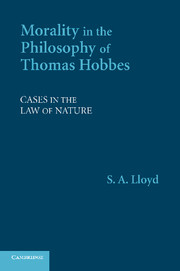Preface
Published online by Cambridge University Press: 30 September 2009
Summary
[T]hey that have written of justice and policy in general, do all invade each other and themselves with contradictions. To reduce this doctrine to the rules and infallibility of reason, there is no way, but, first, put such principles down for a foundation, as passion, not mistrusting, may not seek to displace; and afterwards to build thereon the truth of cases in the law of nature (which hitherto have been built in the air) by degrees, till the whole have been inexpugnable.
(Elements of Law, Dedicatory Epistle, emphasis added)This is a book about Hobbes's moral philosophy. It examines his “Laws of Nature” because Hobbes insisted that “the science of them is the true and onely moral philosophy”. Hobbes terms the conclusions of moral philosophizing once Laws of Nature have been brought to bear on specific practical questions “cases in the law of nature”, hence the book's title. I used to think that Hobbes did not have any genuine moral philosophy. My reason for thinking so was not the reason offered by many commentators in support of the same conclusion, namely, that Hobbes's egoistic psychology leaves no room for the possibility of genuinely moral motivation for action. That view rests, I believe, on an incorrect characterization of the psychology of Hobbesian men. Rather, I thought that Hobbes saw his political philosophy as needing no moral philosophy to undergird it. According to Hobbes's explicit chart of the sciences in chapter 9 of Leviathan, civil philosophy is a distinct science of political rights and duties derived from the concept of commonwealth – which is the concept of an artificial (man-made) entity – and thus not a branch of natural philosophy, while ethics while ethics – which Hobbes describes as a branch of science concerning consequences of the passions of men – is a part of natural philosophy.
- Type
- Chapter
- Information
- Morality in the Philosophy of Thomas HobbesCases in the Law of Nature, pp. ix - xviPublisher: Cambridge University PressPrint publication year: 2009



